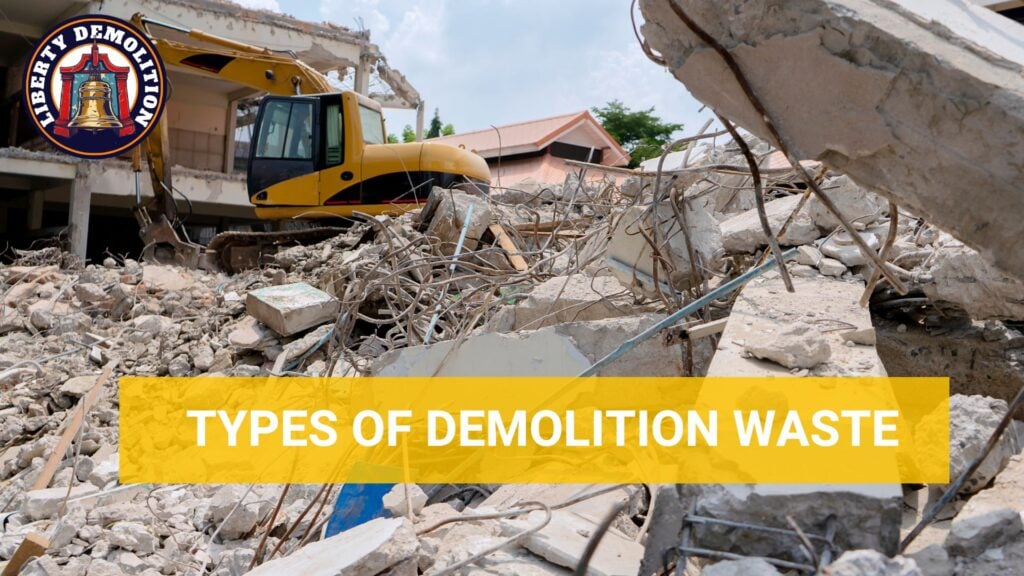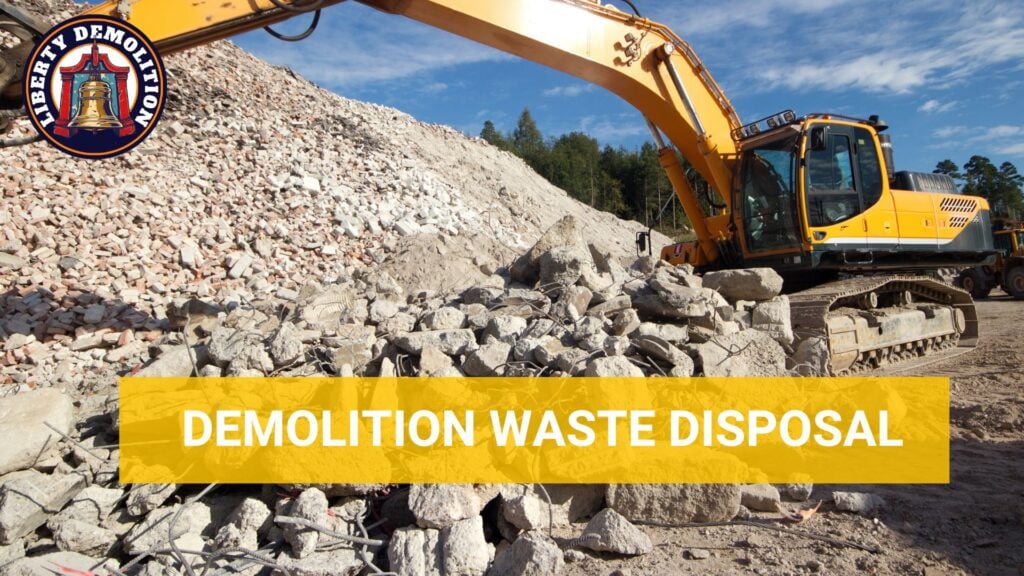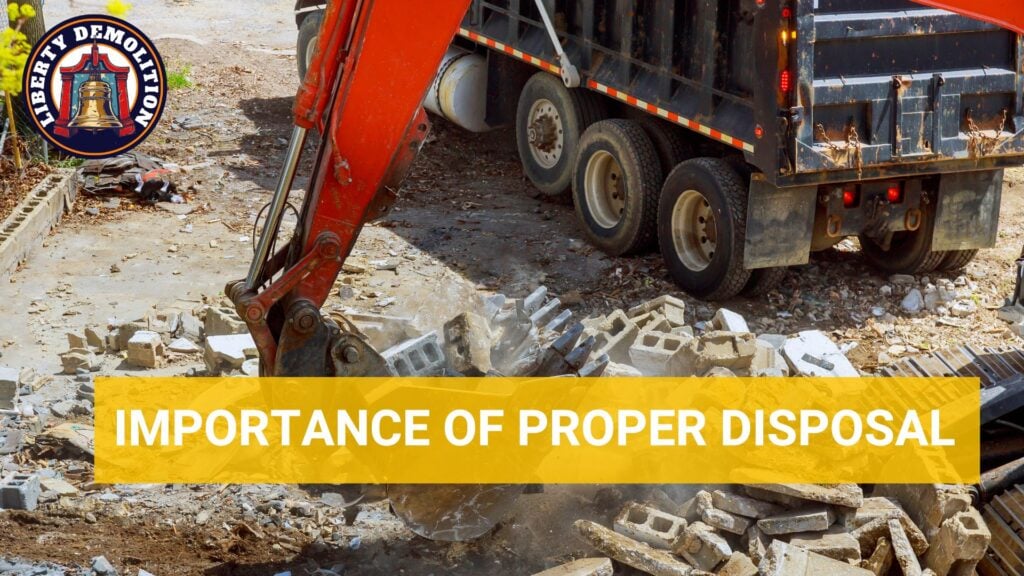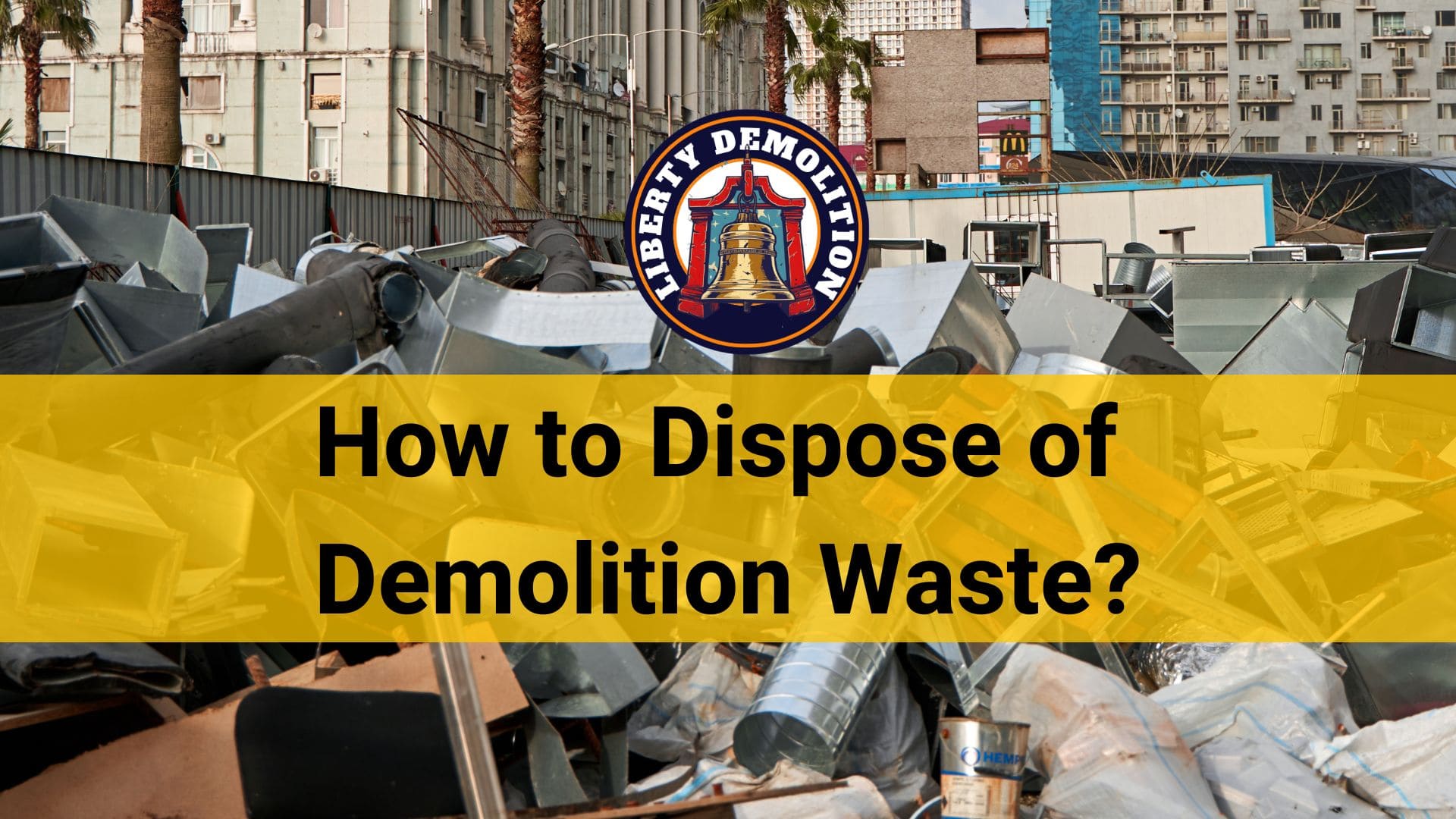How do you dispose of demolition waste?
- Identify the type of waste.
- Separate recyclable materials.
- Hire a professional waste disposal service.
- Check local legal requirements.
- Recycle or repurpose materials where possible.
- Hire a licensed waste removal company if needed.
Curious about the details and legalities? Let’s head on right to it. Plus, I’ll share other tips and best practices for efficient demolition waste disposal.
What Legal Requirements Do I Need?
Demolition work is more than just tearing things down. Disposing of the waste you’re left with requires following specific rules and regulations to ensure both environmental safety and public health:
- Permits and Notifications: Get all necessary permits before initiating a demolition project. Some regions may require you to notify local authorities, especially for a big project or if hazardous materials are involved.
- Waste Classification: Depending on where you live, demolition waste may be classified into different categories. Certain types of waste, like asbestos, paints, and some electronics, are considered hazardous and can’t be dumped with general waste. They require special handling and disposal techniques.
- Landfill Restrictions: Landfills often have strict rules regarding what can and cannot be accepted. Mixing non-allowed items can lead to refusal of your waste and potential penalties.
- Recycling Protocols: Many councils or governments encourage or even mandate the recycling of certain demolition waste types, such as concrete, bricks, and metals.
- Transport Regulations: Transporting large volumes of waste or particularly hazardous materials might require special permits or vehicles. This is especially true if crossing jurisdictional boundaries. This could include the type of vehicle used, covering the waste during transit, or even the routes to be taken.
- Documentation: It’s crucial to maintain records of all your demolition waste – where it came from, how it was disposed of, and any fees or permits associated with its disposal. This documentation can save you from potential legal troubles.

What are the Types of Demolition Waste?
Every demolition job, whether it’s tearing down a house or deconstructing a skyscraper, results in heaps of waste materials. Recognizing the different types of demolition waste is the first step toward proper disposal and recycling:
Concrete and Masonry
Concrete and masonry waste includes old concrete slabs, bricks, tiles, and blocks. It’s often heavy, bulky, and tough, but that doesn’t mean it’s useless. Many facilities grind these materials to create aggregate, which can be used in new construction projects.
Wood
Wood waste can range from large beams to old plywood or chipboard pieces that can be painted, treated, or untreated. If the wood is in decent condition, it can be repurposed for other projects. Wood recycling facilities can chip it into wood chips or mulch, which can be used in landscaping or manufacturing. However, remember that treated or painted wood might have restrictions due to the chemicals used.
Metals
Metals from demolition sites can be ferrous (like iron and steel) or non-ferrous (like copper, aluminum, and brass). They are durable, often heavy, and quite valuable. Most metals can be melted down and reused indefinitely without degradation of properties. Selling to scrap yards can be profitable, especially for non-ferrous metals. While deciding what to do, keep metals separated and clean. Separate ferrous from non-ferrous metals and ensure they’re free from non-metal contaminants.
Plastics
Plastics in demolition sites vary, from large PVC or ABS pipes, plastic insulation, vinyl siding, or even smaller plastic fixtures and fittings and more. Unlike other materials, not all plastics are easy to recycle. Some specialized facilities accept construction-related plastics for recycling. Still, you might need to reach out to specific waste management agencies to handle non-recyclable plastics. Consider reusing where possible.
Glass
Glass (windows, doors, partitions) can be found in multiple elements of a structure. They can be clear, tinted, or even treated. It can be flat (like windows) or container-based (like bottles or jars left behind). According to Glass Packaging Institute, glass can be recycled endlessly without losing its quality. Broken or unwanted glass can be taken to recycling facilities where it’s melted down and repurposed. However, certain types, like tempered or laminated glass, may have different recycling processes.
Hazardous Materials
Among all demolition waste types, hazardous materials are the most crucial to handle with care due to their potential health and environmental risks. These materials range from asbestos (found in old insulation and tiles) to lead (in old paints), solvents, chemicals, and even some treated wood. They pose health risks and can contaminate the environment if not disposed of correctly.
Due to the inherent risks, professionals and specialized disposal facilities need to handle hazardous materials. It’s essential not to mix hazardous waste with regular demolition waste. Instead, store them in clearly labeled containers and contact your local waste management authority for guidance.
Sorting and Separating
Properly sorting through the debris can mean the difference between an efficient waste management plan and a logistical nightmare. But why is this so crucial?
- Environmental Responsibility: By sorting waste, recyclables can be correctly processed. It reduces the amount sent to landfills and minimizes the environmental impact.
- Cost Efficiency: Disposing mixed waste often costs more than disposing of sorted waste. Furthermore, recyclables, especially metals, can be sold, which can offset disposal costs.
- Safety: If mixed with general waste, hazardous materials can pose safety risks.
- Compliance with Regulations: Many municipalities have strict regulations on waste disposal. Sorted waste ensures adherence to these rules.
Effective Techniques for Sorting and Separating Demolition Waste
Take note of the following when sorting demolition waste:
- Plan ahead.
- Set up clearly labeled bins or containers for different materials (e.g., wood, metal, glass).
- Train the team.
- Deal with hazardous waste first.
- For larger demolition projects, machinery like excavators with sorting grapples can be used to separate large chunks of materials like concrete, wood beams, and metal infrastructure.
- Consider on-site processing methods like crushing concrete as aggregate or chipping wood for mulch.
- Know where your nearest recycling facilities are and what materials they accept.
- Regularly monitor the sorting process to ensure no cross-contamination of waste streams.

How to Dispose of Demolition Waste: Safety Tips and Precautions
Beneath the destruction in a demolition project lies a potential minefield of hazards. For those involved, take note of the following safety tips and precautions:
Understanding the Risks
The most common hazards on a demolition site include:
- Falling debris
- Dust and airborne particles
- Hazardous materials (asbestos, lead paint, and chemicals)
- Electrical and fire hazards
- Noise pollution coming from the heavy machinery
Key Safety Tips and Precautions
When sorting and handling demolition waste, observe the following precautions:
- Ensure every person on the site is equipped with the appropriate PPE, such as hard hats, safety goggles, high visibility vests, steel-toed boots, respiratory masks, ear protection, etc.
- Clearly mark out the demolition area with barricades or tape.
- Always check the forecast and be prepared to postpone if conditions are unfavorable.
- Before starting, ensure all utilities (gas, electricity, water) are shut off and properly secured.
- Make sure that everyone on-site is trained in using their tools and machinery.
- Regularly inspect equipment to ensure they’re in good working order.
- Use methods like wet demolition (where water is sprayed) to reduce airborne dust.
- Always have an emergency response plan in place.
Disposal Options
With piles of debris and waste left after a demolition project, you may be left wondering – “What’s next?” Here’s a look at your disposal choices:
Landfills
Landfills are designated areas where waste is managed and deposited. They can handle a vast array of waste types, including non-recyclables. However, landfills can lead to groundwater contamination, methane gas emissions, and loss of biodiversity. When you have no option but this one always opt for sanctioned landfills that follow environmental guidelines. Plus, consider separating waste beforehand to minimize the amount sent to landfills.
Recycling Facilities
Recycling turns waste materials into new products, thereby reducing the need to extract fresh raw materials and lessening environmental impact. In many cases, recycling can be more cost-effective than other disposal methods, especially when you factor in potential earnings from scrap metals. However, not all demolition waste can be recycled, so it’s important to understand what your local facility accepts.
Transfer Stations
Transfer stations serve as a collection facility where smaller waste collection vehicles transfer their loads into larger vehicles. These larger trucks then safely and efficiently transport the waste to landfills or treatment facilities. Some transfer stations sort and segregate waste, directing recyclables to appropriate facilities. However, transfer stations are not end disposal points but intermediate stops, so there’s an added step in the disposal process. There might also be fees associated with using transfer stations, and the added transport step can increase costs.

How Much Does a Disposal of Demolition Waste Cost?
Many are often surprised to find that disposal can be a significant line item on their bill. But why does it vary, and what dictates the price? Here are the factors that influence the cost of demolition waste disposal:
- Volume and Weight: Simply put, the more you have to dispose of, the more it’s going to cost. Charges often correlate with the size of the dumpster or the tonnage of the waste.
- Type of Waste: Non-hazardous waste is generally cheaper to dispose of, while hazardous materials like asbestos can entail higher costs due to specialized handling requirements.
- Local Regulations: Depending on the municipality or region, there may be levies, taxes, or fees associated with waste disposal, particularly when it comes to landfills.
- Distance to Disposal Site: Transporting waste over long distances can add to costs due to fuel and labor.
- Disposal Method: Options like landfills, recycling facilities, and transfer stations come with varying price tags.
- Market for Recyclables: If you have recyclables, especially metals, the market price can influence earnings (or costs). In some cases, recyclables can offset disposal costs or even lead to a profit.
General Pricing Guidelines
While it’s hard to provide exact numbers without knowing specifics (as prices can vary by region, current market conditions, etc.), here’s a rough guide:
- Landfills: Costs are often based on tonnage. On average, you might expect anywhere from $20 to $100 per ton, though it can be higher in areas where landfill space is at a premium.
- Recycling Facilities: Some facilities charge a fee, while others might buy recyclables from you. For instance, concrete might cost around $10 to $20 per ton to drop off, but metals can earn you anywhere from $50 to $200 per ton, depending on the metal and market conditions.
- Transfer Stations: Fees can range from $50 to $150 per ton, factoring in the station’s service and the subsequent transportation to the final disposal site.
- Hazardous Waste: This is where costs can skyrocket. Asbestos disposal, for example, can run from $200 to $2,000 per ton due to the specialized handling and disposal requirements.

Importance of Proper Demolition Waste Disposal
Why is it important to observe proper ways on how to dispose of demolition waste?
Environmental Conservation
- It minimizes landfill use.
- Proper sorting and recycling allow valuable materials, like metals or wood, to be repurposed.
- By adhering to regulations and ensuring hazardous waste is treated correctly, we prevent unnecessary pollution and its associated health risks.
Economic Implications
- Proper waste disposal and recycling operations create jobs in waste management, sorting facilities, and recycling plants.
- Recyclables, especially metals, can be sold, turning what could have been a cost into revenue.
- Investing in proper disposal now can save significant sums in the future.
Societal Impact
- Hazardous materials, if not appropriately handled, can pose severe health risks.
- Proper waste disposal demonstrates responsibility and often leads to smoother project approvals and fewer community objections in future projects.
- Responsible handling of demolition waste sets a standard for others to follow, fostering a culture of environmental stewardship and responsibility.
Regulatory Compliance
- Proper adherence to regulations avoids financial penalties and potential legal repercussions.
- For contractors and developers, consistent compliance ensures they maintain their licenses and are deemed trustworthy by regulatory bodies.
Demolition Waste Disposal Simplified!
Demolition projects, whether big or small, result in a variety of waste, from recyclables like concrete, metals, and glass to hazardous materials like asbestos and lead. Properly identifying, sorting, and disposing of these wastes minimizes landfill use, prevents potential health risks, creates economic opportunities, and ensures regulatory compliance.
The complexities of demolition waste disposal highlight the need for professional expertise. By hiring seasoned demolition contractors, you can ensure that the waste from your demolition project is handled safely, efficiently, and in an environmentally conscious manner.
Don’t let the complexities of demolition waste disposal weigh you down. In these instances, rest assured that we at Liberty Demolition got your back. We’re a trusted demolition contractor in Philadelphia, committed to safety, precision, and sustainability. When you have us on board, rest assured that your project is in the best hands. Navigate your next demolition project with ease and assurance by calling us today. Get in touch, and we will give you a FREE quote for your demolition project.






